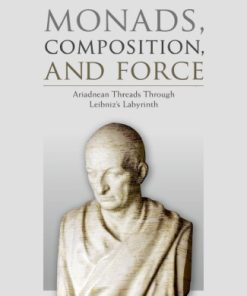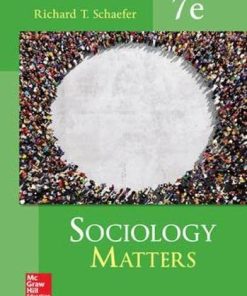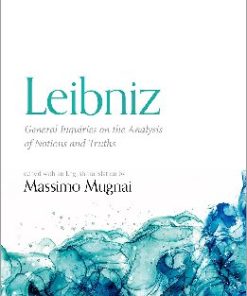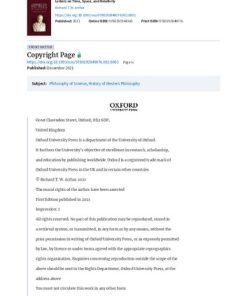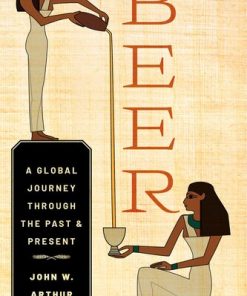Leibniz on Time, Space, and Relativity
$50.00 Original price was: $50.00.$25.00Current price is: $25.00.
Leibniz on Time, Space, and Relativity – Ebook Instant Download/Delivery ISBN(s): 9780191944345,9780192849076,0191944343,0192849077,9780192665607, 019266560X
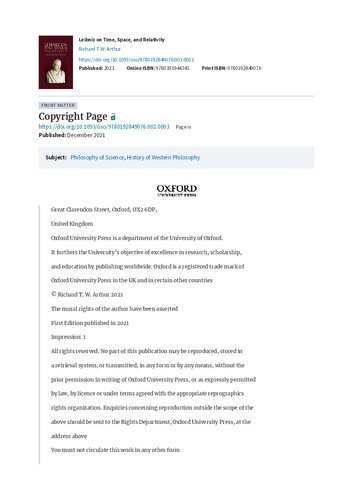
Product detail:
- ISBN 10: 019266560X
- ISBN 13: 9780192665607
- Author: Richard T. W. Arthur
In this book, Arthur gives fresh interpretations of Gottfried Leibniz’s theories of time, space, and the relativity of motion, based on a thorough examination of Leibniz’s manuscripts as well as his published papers. These are analysed in historical context, but also with an eye to their contemporary relevance. Leibniz’s views on relativity have been extremely influential, first on Mach, and then on Einstein, while his novel approach to geometry in his analysis situs inspired many later developments in geometry. Arthur expounds the latter in some detail, explaining its relationship to Leibniz’s metaphysics of space and the grounding of motion, and defending Leibniz’s views on the relativity of motion against charges of inconsistency. The brilliance of his work on time, though, has not been so well appreciated, and Arthur attempts to remedy this through a detailed discussion of Leibniz’s relational theory of time, showing how it underpins his theory of possible worlds, his complex account of contingency, and his highly original treatment of the continuity of time, providing formal treatments in an appendix. In other appendices, Arthur provides translations of previously untranslated writings by Leibniz on analysis situs and on Copernicanism, as well as an essay on Leibniz’s philosophy of relations. In his introductory chapter he explains how the framework for the book is provided by the interpretation of Leibniz’s metaphysics he defended in his earlier Monads, Composition, and Force (OUP 2018, winner of the 2019 annual JHP Book Prize for best book in the history of philosophy published in 2018).
Table of contents:
- 1. De tempore: Leibniz’s Theory of Time
- Introduction
- 1.1 The Relational Core
- 1.2 The Causal Theory of Temporal Order
- 1.3 Contingency, Compossibles, and Counterparts
- 1.4 Reduction, Ideality, and the Homogeneity of Time
- 1.5 Change, Vague States, and Physical Continuity
- 1.6 Conclusion
- 2. De loco: Leibniz’s Theory of Space
- Introduction
- 2.1 Relative Space and the Order of Situations
- 2.2 On the Genesis of Leibniz’s Theory of Space
- 2.3 The Analysis of Situation
- 2.4 The Metaphysics of Space
- 2.5 Spaces: Real, Phenomenal, and Abstract
- 2.6 Conclusion
- 3. De motu: Leibniz on the Relativity of Motion
- Introduction
- 3.1 Change of Situation and Motion with Respect to Cause
- 3.2 Copernicanism and Instrumentalism
- 3.3 Force and the Metaphysics of Motion
- 3.4 Rotational Motion: Leibniz vs. Newton
- 3.5 Motion through Space and Leibnizian Spacetime
- 3.6 Conclusion
People also search:
You may also like…
Politics & Philosophy - Anthropology
Politics & Philosophy - Social Sciences
Politics & Philosophy - Government & Politics
Politics & Philosophy - Sociology
ISE eBook Online Access for Sociology Matters 7th EditionRichard T. Schaefer
Politics & Philosophy - General & Miscellaneous Philosophy
Uncategorized
Leibniz: General Inquiries on the Analysis of Notions and Truths Bilingual Edition Massimo Mugnai
Science (General)
Politics & Philosophy - Major Branches of Philosophical Study




